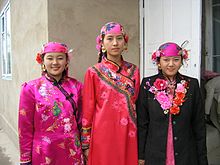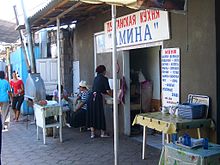Dungan people
![]()
This article is about the Muslim Chinese minority of the Dungan; for the language of the same name, see Dungan language.
![]()
This article or section needs revision. More details should be given on the discussion page. Please help improve it, and then remove this tag.
The Dungans (Chinese 東干族, pinyin dōng gān zú; Russian Дунгане) are a Muslim-Chinese minority living mainly in the Central Asian successor states of the Soviet Union. Their language, a Chinese dialect, is Dungan (東干語); the two main dialects are the Gansu and Shaanxi dialects. There are about 110,000 Dungans worldwide.

Dungan women in Kazakhstan
Origin of the ethnic groups
The term "Dungans" is now used for Hui Chinese who have left China and live in Central Asia. It seems to be primarily a foreign term for these population groups (see origin of term), which has since developed into a name in its own right. Before the founding of the People's Republic, the term was also used in part for the Hui within China.
Dungans are found particularly in Kyrgyzstan and Kazakhstan, with smaller minorities also living in Uzbekistan and Russia. The ancestors of these groups were Hui Chinese who fled China during the Muslim uprisings in the 1970s and 1980s. Dungans are predominantly of Han Chinese origin with a common religion, Islam.
Isolation from the centers of Islam also led to deviations in religious practices.

Dungan restaurant in Bishkek
Hui riots of the 19th/20th century
On the circumstances that led to emigration from China in the 19th century:
In 1818, 1834-1840 and 1855-1873, the Muslims in Yunnan rose up. The uprising, triggered by economic rivalry between Han Chinese and Muslim workers, was bloodily put down (the so-called Panthay Rebellion), with a million people losing their lives. Then, from 1862 to 1878, the so-called "Dungan uprisings" against Chinese rule occurred in the provinces of Shaanxi, Gansu, and Xinjiang, paralleling the Hodja uprising in Kashgaria (see Jakub Bek), temporarily creating independent territories and ultimately claiming an estimated 10 million lives. The following decade saw increased emigration of Muslims to the Tsarist Empire.
The suppression of these uprisings reinforced the tendency to create separate residential quarters and to practice occupations typical of these ethnic groups. Around 1937, there was renewed unrest among the Hui in Gansu, under Ma Zhongying (马仲英), which threatened to spread to Xinjiang as well.
Questions and Answers
Q: Who are the Dungan people?
A: The Dungan people are ethnic Muslims who originated from China and currently reside in regions of the former Soviet Union and Xinjiang.
Q: What did the Russians and Turkic-speaking peoples call the Dungan people?
A: The Russians and Turkic-speaking peoples called the Dungan people Dungan.
Q: Why do the Dungan people refer to themselves as Hui?
A: The Dungan people refer to themselves as Hui because that is what their ancestors called themselves.
Q: Where did the Dungan language come from?
A: The Dungan language came from Mandarin Chinese.
Q: What other languages have influenced the Dungan language?
A: The Dungan language includes many Arabic and Persian loanwords.
Q: How is the Dungan language different from Chinese?
A: The Dungan language uses some words that are no longer used in Chinese dialects today and is written using Cyrillic instead of Chinese characters.
Q: What is the tonal system of the Dungan language?
A: The tonal system of the Dungan language is similar to Chinese as it is also a tonal language.
Search within the encyclopedia